河南省洛阳市汝阳县实验高中2020届高三英语11月月考试题
高三上学期11月月考英语试题 (3)
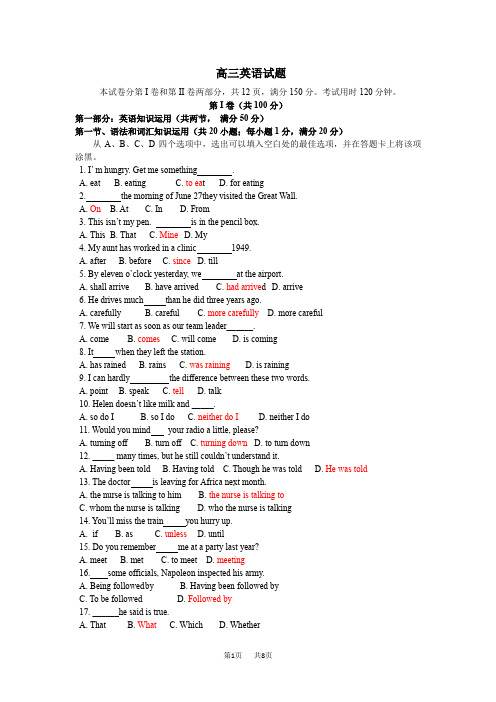
高三英语试题本试卷分第I卷和第II卷两部分,共12页,满分150分。
考试用时120分钟。
第I卷(共100分)第一部分:英语知识运用(共两节,满分50分)第一节、语法和词汇知识运用(共20小题;每小题1分,满分20分)从A、B、C、D四个选项中,选出可以填入空白处的最佳选项,并在答题卡上将该项涂黑。
1. I’ m hungry. Get me something .A. eatB. eatingC. to ea tD. for eating2. the morning of June 27they visited the Great Wall.A. OnB. AtC. InD. From3. This isn’t my pen. is in the pencil box.A. ThisB. ThatC. MineD. My4. My aunt has worked in a clinic 1949.A. afterB. beforeC. sinceD. till5. By eleven o’clock yesterday, we at the airport.A. shall arriveB. have arrivedC. had arrive dD. arrive6. He drives much than he did three years ago.A. carefullyB. carefulC. more carefullyD. more careful7. We will start as soon as our team leader______.A. comeB. comesC. will comeD. is coming8. It when they left the station.A. has rainedB. rainsC. was rainingD. is raining9. I can hardly the difference between these two words.A. pointB. speakC. tellD. talk10. Helen doesn’t like milk and _____.A. so do IB. so I doC. neither do ID. neither I do11. Would you mind your radio a little, please?A. turning offB. turn offC. turning downD. to turn down12. _____ many times, but he still couldn’t understand it.A. Having been toldB. Having toldC.Though he was toldD. He was told13. The doctor is leaving for Africa next month.A. the nurse is talking to himB. the nurse is talking toC. whom the nurse is talkingD. who the nurse is talking14. You’ll miss the train you hurry up.A.ifB. asC. unlessD. until15. Do you remember me at a party last year?A. meetB. metC. to meetD. meeting16. some officials, Napoleon inspected his army.A. Being followed b yB. Having been followed byC. To be followedD. Followed by17. ______he said is true.A. ThatB. WhatC. WhichD. Whether18. If there were no subjunctive mood(虚拟语气), English much easier.A. will beB. would beC. could have beenD. would have been19. In fact the Swede did not understand the three questions _____ were asked in French.A. thatB. whatC. in whichD. /20. There was plenty of time. She .A. mustn’t have hurriedB. needn’t have hurr iedC. must not hurryD. couldn’t have hurried第二节:完形填空(共20小题;每小题1.5分,满分30分)阅读下面短文,从短文后所给各题的四个选项(A、B、C和D)中,选出可以填入空白处的最佳选项,并在答题卡将该项涂黑。
高三11月月考英语试题 (2)
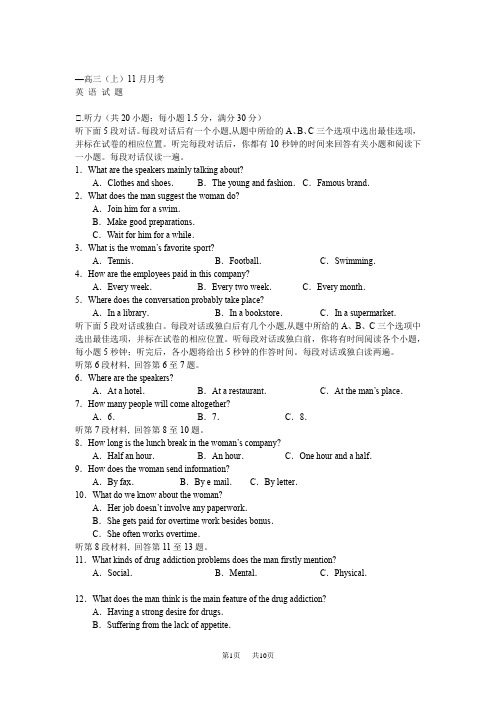
—高三(上)11月月考英语试题Ⅰ.听力(共20小题;每小题1.5分,满分30分)听下面5段对话。
每段对话后有一个小题,从题中所给的A、B、C三个选项中选出最佳选项,并标在试卷的相应位置。
听完每段对话后,你都有10秒钟的时间来回答有关小题和阅读下一小题。
每段对话仅读一遍。
1.What are the speakers mainly talking about?A.Clothes and shoes.B.The young and fashion.C.Famous brand.2.What does the man suggest the woman do?A.Join him for a swim.B.Make good preparations.C.Wait for him for a while.3.What is the woman’s favorite sport?A.Tennis.B.Football.C.Swimming.4.How are the employees paid in this company?A.Every week.B.Every two week.C.Every month.5.Where does the conversation probably take place?A.In a library.B.In a bookstore.C.In a supermarket.听下面5段对话或独白。
每段对话或独白后有几个小题,从题中所给的A、B、C三个选项中选出最佳选项,并标在试卷的相应位置。
听每段对话或独白前,你将有时间阅读各个小题,每小题5秒钟;听完后,各小题将给出5秒钟的作答时间。
每段对话或独白读两遍。
听第6段材料, 回答第6至7题。
6.Where are the speakers?A.At a hotel.B.At a restaurant.C.At the man’s place.7.How many people will come altogether?A.6.B.7.C.8.听第7段材料, 回答第8至10题。
【人教版】2020高三英语11月月考试题新人教版新版
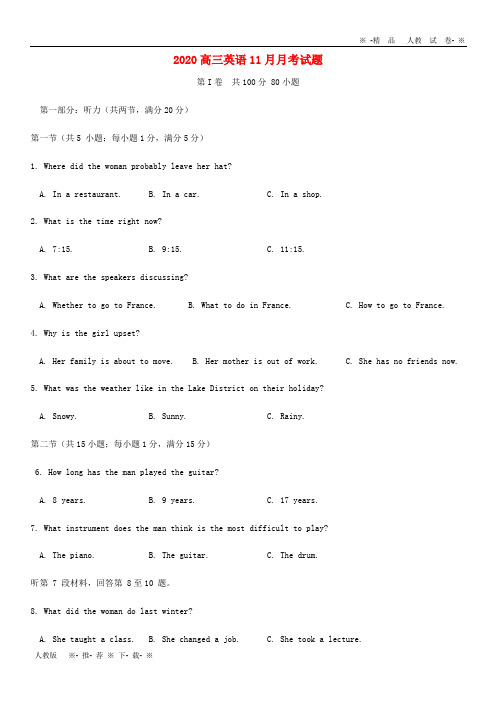
2020高三英语11月月考试题第I卷共100分 80小题第一部分:听力(共两节,满分20分)第一节(共5 小题;每小题1分,满分5分)1. Where did the woman probably leave her hat?A. In a restaurant.B. In a car.C. In a shop.2. What is the time right now?A. 7:15.B. 9:15.C. 11:15.3. What are the speakers discussing?A. Whether to go to France.B. What to do in France.C. How to go to France.4. Why is the girl upset?A. Her family is about to move.B. Her mother is out of work.C. She has no friends now.5. What was the weather like in the Lake District on their holiday?A. Snowy.B. Sunny.C. Rainy.第二节(共15小题;每小题1分,满分15分)6. How long has the man played the guitar?A. 8 years.B. 9 years.C. 17 years.7. What instrument does the man think is the most difficult to play?A. The piano.B. The guitar.C. The drum.听第 7 段材料,回答第 8至10 题。
8. What did the woman do last winter?A. She taught a class.B. She changed a job.C. She took a lecture.9. Why is the man happy?A. He can give lectures after retirement.B. He has retired and begins to learn computer.C. He can communicate with his grandchildren online.10. What is the woman’s regular job?A. A librarian.B. A salesperson.C. A lecturer.听第 8 段材料,回答第 11 至 13 题。
河南省2020届高三英语11月月考试题
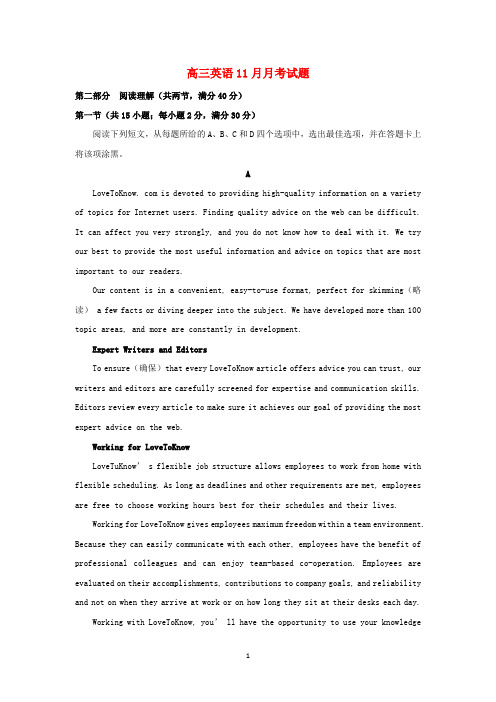
高三英语11月月考试题第二部分阅读理解(共两节,满分40分)第一节(共15小题;每小题2分,满分30分)阅读下列短文,从每题所给的A、B、C和D四个选项中,选出最佳选项,并在答题卡上将该项涂黑。
ALoveToKnow. com is devoted to providing high-quality information on a variety of topics for Internet users. Finding quality advice on the web can be difficult. It can affect you very strongly, and you do not know how to deal with it. We try our best to provide the most useful information and advice on topics that are most important to our readers.Our content is in a convenient, easy-to-use format, perfect for skimming(略读) a few facts or diving deeper into the subject. We have developed more than 100 topic areas, and more are constantly in development.Expert Writers and EditorsTo ensure(确保)that every LoveToKnow article offers advice you can trust, our writers and editors are carefully screened for expertise and communication skills. Editors review every article to make sure it achieves our goal of providing the most expert advice on the web.Working for LoveToKnowLoveTuKnow’ s flexib le job structure allows employees to work from home with flexible scheduling. As long as deadlines and other requirements are met, employees are free to choose working hours best for their schedules and their lives.Working for LoveToKnow gives employees maximum freedom within a team environment. Because they can easily communicate with each other, employees have the benefit of professional colleagues and can enjoy team-based co-operation. Employees are evaluated on their accomplishments, contributions to company goals, and reliability and not on when they arrive at work or on how long they sit at their desks each day.Working with LoveToKnow, you’ ll have the opportunity to use your knowledgeand skills to solve exciting problems and to contribute to the growing success of this online media company!21. What is the purpose of LoveToKnow. com?A. Teaching Internet users skills in giving advice.B. Offering Internet users high-quality information.C. Helping Internet users develop interesting topics.D. Providing Internet users with entertainment information.22. How does LoveToKnow make sure that its advice can be trusted?A. By doing surveys and experiments.B. By communicating with Internet users.C. By consulting and checking with experts.D. By selecting writers and editors carefully.23. What benefit can employees get by working for LoveToKnow?A. Being evaluated on their working hours.B. Becoming professional in many fields easily.C. Personalizing working hours on certain conditions.D. Putting off deadlines when being busy with housework.BFiorello LaGuardia was mayor of New York City during the worst days of the Great Depression and all of World War Ⅱ. He was called by New Yorkers “the Little Flower”because he was short and always wore a carnation(康乃馨). He was a colorful character who used to ride the New York City fire trucks, raid (突袭)places that were illegal to make and sell alcohol with the police department, take homeless children to baseball games, and whenever the New York newspapers were on strike, he would go on the radio and read the Sunday funnies to the kids.One bitterly cold night in January of 1935, the mayor turned up at a night court that served the poorest district of the city. LaGuardia dismissed the judge for the evening and took over the bench himself. Within a few minutes, an old woman was brought before him, charged with stealing a loaf of bread. She told LaGuardia herdaughter’ s husband had deserted her, that her daughter was sick, and that her two grandchildren were starving. But the shopkeeper, from whom the bread was stolen, refused to drop the charges. “It’ s a bad neighborhood,Your Honor,” the man told the mayor. “She’ s got to be punished to teach other people around here a lesson.”LaGuardia sighed. He turned to the woman and said, “I’ ve got to punish you. The law makes no exceptions—ten dollars or ten days in jail.” But even as he pronounced sentence, the mayor reached into his pocket. He took out a bill and said, “Here is the ten-dollar fine which I now pay for the defendant(被告); and furthermore, I am going to fine everyone in this courtroom fifty cents for living in a town where a person has to steal bread so that her grandchildren can eat. Mr. Bailiff, collect the fines to the defendant.”So the following day the New York City newspaper reported that $47.50 was turned over to an old woman who had stolen a loaf of bread.24. What can we know about Fiorello LaGuardia from paragraph one?A. He was interested in planting carnations.B. He was enthusiastic about public affairs.C. He was a mayor for only a very short time.D. He was popular for his unique dressing style.25. Why did the old woman steal the bread?A. To test the justice of the court.B. To cure her daughter.C. To punish the cruel shopkeeper.D. To feed her grandchildren.26. What was the shopkeeper’s excuse for insisting on the charges?A. To show the mayor the danger of theft.B. To prevent similar things from happening.C. To make people understand the spirit of law.D. To punish the old woman’ s family indirectly.27. Which of the following can best describe Fiorello LaGuardia?A. Optimistic and responsible.B. Confident and unselfish.C. Kind-hearted and wise.D. Knowledgeable and ambitious.CInsects could disappear within a century at current rate of decline, says Global Review.The world’s insects are moving quickly down the path to dying out, indicating a disastrous collapse(崩溃)of nature’ s ecosystems is likely to happen, according to the first global scientific review. More than 40% of insect species are declining and a third are endangered, the analysis found. The rate of extinction(灭绝)is eight times faster than that of mammals, birds and reptiles.“It should be of huge concern to all of us, for insects are at the heart of every food web—they pollinate the large majority of plant species, keep the soil healthy, recycle nutrients, control pests, and much more. Love them or hate them, we humans cannot survive without insects,” said Prof Dave Goulson at the University of Sussex in the UK.The analysis, published in the journal Biological Conservation, says intensive agriculture is the main driver of the declines, particularly the heavy use of pesticides(杀虫剂). Urbanisation and climate change are also significant factors. One of the biggest impacts of insect loss is on the many birds, reptiles, amphibians and fish that eat insects. A small number of adaptable species are increasing in number, but not nearly enough to outweigh the big losses.Matt Shardlow, at the conservation charity Buglife, said, “It is alarming to see this collation of evidence that shows the state of the world’ s insect populati ons. It is increasingly obvious that the planet’ s ecology is breaking and there is a need for an intense and global effort to stop and reverse(反转)these terrible trends.”28. What did Prof Dave stress in his speech?A. Insects are vital to food webs.B. Not all people love insects.C. Scientists are concerned about insect loss.D. Humans need certain conditions for survival.29. Which of the following is most influenced by insect loss?A. Animals that feed on insects.B. Adaptable animal species.C. Pests that are used to pesticides.D. Crops produced by intensive agriculture.30. How did Matt Shardlow sound when talking about the state of insect loss?A. Relaxed.B. Uncaring.C. Humorous.D. Worried.31, What is the best title for the text?A. The extinction rate of insects gets slowed down.B. The failure of nature’ s ecosystems can be avoided.C. Sharp drops in insect numbers endanger ecosystems.D. Insect extinction harms the diversity of animal species.DNearly everyone will know they have felt anxious about a maths question at some time in their lives. What may not seem so obvious is that many other people have felt the same way and that maths anxiety is a real problem.So much so that the Maths Anxiety Trust has been set up to raise awareness of the issue. A poll for the trust found more than a third of 15- to 24-year-olds feel anxious when shown a maths problem. The same applies to one in five British adults. This comes as little surprise to Celia Hoyles, professor of mathematics education at University College London(UCL). “With maths, there’s a right or a wrong answer and that’s why people can feel so anxious—they’re scared of looking foolish, ” she says.One problem that needs to be solved is how maths is taught. We need teachers to be able to share students’feelings and to see other points of view, to understand where students are finding aspects of the subject difficult so they can be encouraged to overcome those difficulties.Technology in the classroom often gets teachers and parents very angry, causing extreme predictions of “robot teachers” replacing real people—and many education technology products have appeared in the classroom with great fanfare(宣扬)in the past few years only to fall by the wayside. Simply digitizing(数字化)how mathsis taught isn’ t enough. Learning technology needs to be designed with deep understanding of how pupils learn and a healthy reality check around how teachers want to use it.“Be aware of terms such as artificial intelligence(AI),” Georgie Hart, education director at Sparx, says. “AI can be a very disempowering (使失去权力的) term for teachers; it’ s not helpful. But the concept of adaptive teaching allows teachers to do more of the job they love.”32. What is the purpose of the Maths Anxiety Trust?A. To help people build trust in maths educators.B. To teach people basic mathematical knowledge.C. To make people know more about maths anxiety.D. To help people gain confidence in solving maths problems.33. Why do some people feel anxious about maths problems according to Celia Hoyles?A. Maths problems can easily expose their intelligence.B. They are good at solving problems in other subjects.C. Maths problems don’ t have clear and accurate answers.D. They don’ t think solving maths problems is of much use.34. What can teachers do to help solve the maths anxiety problem?A. Agree with students’ viewpoints.B. Be more considerate towards students.C. Pay more attention to difficult problems.D. Make difficult aspects of the subject easy.35. What does the underlined part “fall by the wayside” in paragraph 5 probablymean?A. Go out of favour.B. Become more attractive.C. Break down secretly.D. Be regarded highly.第二节(共5小题;每小题2分,满分10分)根据短文内容,从短文后的选项中选出能填入空白处的最佳选项,并在答题卡上将该项涂黑。
高三11月月考英语试题 (2)
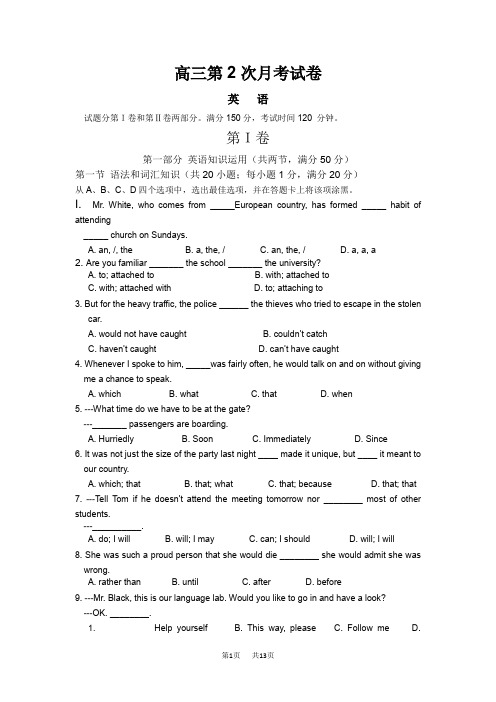
高三第2次月考试卷英语试题分第I卷和第Ⅱ卷两部分。
满分150分,考试时间120 分钟。
第I卷第一部分英语知识运用(共两节,满分50分)第一节语法和词汇知识(共20小题;每小题1分,满分20分)从A、B、C、D四个选项中,选出最佳选项,并在答题卡上将该项涂黑。
I. Mr. White, who comes from _____European country, has formed _____ habit of attending_____ church on Sundays.A. an, /, theB. a, the, /C. an, the, /D. a, a, a2. Are you familiar _______ the school _______ the university?A. to; attached toB. with; attached toC. with; attached withD. to; attaching to3. But for the heavy traffic, the police ______ the thieves who tried to escape in the stolencar.A. would not have caughtB. couldn’t catchC. haven’t caughtD. can’t have caught4. Whenever I spoke to him, _____was fairly often, he would talk on and on without giving me a chance to speak.A. whichB. whatC. thatD. when5. ---What time do we have to be at the gate?---_______ passengers are boarding.A. HurriedlyB. SoonC. ImmediatelyD. Since6. It was not just the size of the party last night ____ made it unique, but ____ it meant to our country.A. which; thatB. that; whatC. that; becauseD. that; that7. ---Tell Tom if he doesn't attend the meeting tomorrow nor ________ most of other students.---__________.A. do; I willB. will; I mayC. can; I shouldD. will; I will8. She was such a proud person that she would die ________ she would admit she was wrong.A. rather thanB. untilC. afterD. before9. ---Mr. Black, this is our language lab. Would you like to go in and have a look?---OK. ________.1. Help yourself B. This way, please C. Follow me D.After you10. ---Can you tell me who _________ for this broken window?--- _________ those naughty boys from another class.A. to blame; They areB. should be blamed; They areC. is to blame; It isD. is blamed; It is11. ---Have you seen Michael recently?---Yes, in fact I saw him this morning. I ________ him for two years.A. haven't seenB. hadn't seenC. didn't seeD. don't see12. ____ every member has arrived, let’s get down to ____ the plan for the next five years.A. Now; working outB. Because; find outC. Since; finding outD. Now that; work out13. To what extent will future scientific discoveries _______ the prolonging(延长) ofhuman life?A. make possibleB. be made possibleC. make it possibleD. be made it possible14. Written in a hurry, __________. How can it be satisfactory?A. they find many mistakes in the reportB. lots of mistakes have been made in the reportC. there are plenty of mistakes in the reportD. the report is full of mistakes15. _____ that Tom got inside the room to see what was going on.A. So strangely did he feelB. So strangely he feltC. So strange did he feelD. So strange he felt16. The woman pulled her hat low down ____ her eyes in order not to be recognized bythe angry crowds.A. underB. overC. belowD. on17. The old man took the police back to the same place ____ he witnessed the robbery.A. thatB. whereC. asD. when18. This problem may lead to more serious ones if ____ unsolved.A. makingB. remainedC. keepingD. left19. He must have got punished yesterday by his parents for what he had done, ________?A. mustn’t heB. hasn’t heC. didn’t heD. needn’t he20. He is such a popular singer that his latest record ___________ more than a million copies.A. has been soldB. has soldC. is soldD. sells第二节完形填空(共20小题;每小题1.5分,满分30分)阅读下面短文,从短文后各题所给的四个选项(A、B、C、D)中,选出可以填入空白处的最佳选项,并在答题卡上将该项涂黑。
高三英语11月月考试题高三全册英语试题_2 (2)
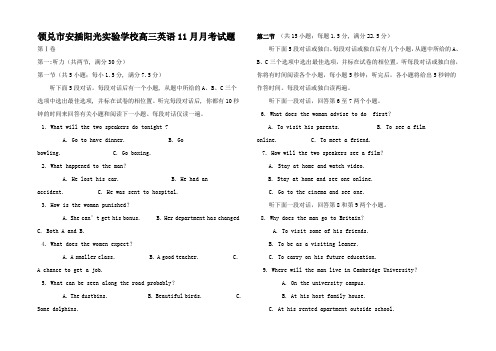
领兑市安插阳光实验学校高三英语11月月考试题第Ⅰ卷第一:听力(共两节, 满分30分)第一节(共5小题;每小1.5分, 满分7.5分)听下面5段对话。
每段对话后有一个小题, 从题中所给的A、B、C三个选项中选出最佳选项, 并标在试卷的相位置。
听完每段对话后, 你都有10秒钟的时间来回答有关小题和阅读下一小题。
每段对话仅读一遍。
1. What will the two speakers do tonight ?A. Go to have dinner.B. Gobowling. C. Go boxing.2. What happened to the man?A. He lost his car.B. He had anaccident. C. He was sent to hospital.3. How is the woman punished?A. She can’t get his bonus.B. Her department has changedC. Both A and B.4. What does the women expect?A. A smaller class.B. A good teacher.C.A chance to get a job.5. What can be seen along the road probably?A. The dustbins.B. Beautiful birds.C. Some dolphins.第二节(共15小题;每题1.5分, 满分22.5分)听下面5段对话或独白。
每段对话或独白后有几个小题,从题中所给的A、B、C三个选项中选出最佳选项,并标在试卷的相位置。
听每段对话或独白前,你将有时间阅读各个小题,每小题5秒钟;听完后,各小题将给出5秒钟的作答时间。
每段对话或独白读两遍。
听下面一段对话,回答第6至7两个小题。
6. What does the woman advise to do first?A. To visit his parents.B. To see a filmonline. C. To meet a friend.7. How will the two speakers see a film?A. Stay at home and watch video.B. Stay at home and see one online.C. Go to the cinema and see one.听下面一段对话,回答第8和第9两个小题。
高三11月月考英语试题 (4)
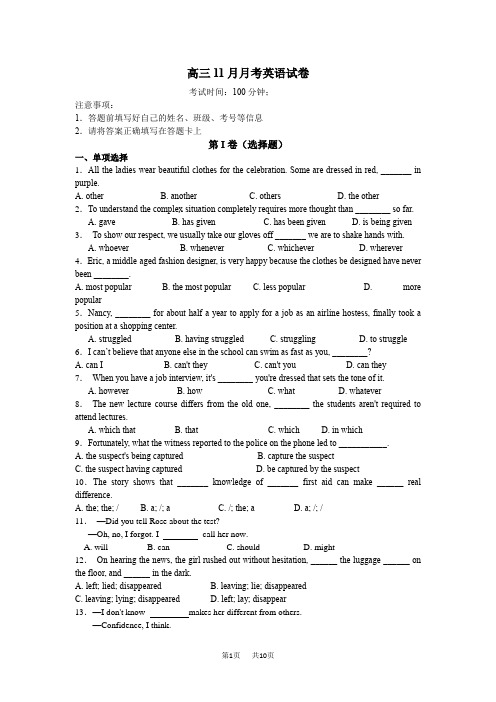
高三11月月考英语试卷考试时间:100分钟;注意事项:1.答题前填写好自己的姓名、班级、考号等信息2.请将答案正确填写在答题卡上第I卷(选择题)一、单项选择1.All the ladies wear beautiful clothes for the celebration. Some are dressed in red, _______ in purple.A. otherB. anotherC. othersD. the other2.To understand the complex situation completely requires more thought than ________ so far.A. gaveB. has givenC. has been givenD. is being given 3.To show our respect, we usually take our gloves off _______ we are to shake hands with.A. whoeverB. wheneverC. whicheverD. wherever 4.Eric, a middle-aged fashion designer, is very happy because the clothes be designed have never been ________.A. most popularB. the most popularC. less popularD. more popular5.Nancy, ________ for about half a year to apply for a job as an airline hostess, finally took a position at a shopping center.A. struggledB. having struggledC. strugglingD. to struggle 6.I can’t believe that anyone else in the school can swim as fast as you, ________?A. can IB. can't theyC. can't youD. can they 7.When you have a job interview, it's ________ you're dressed that sets the tone of it.A. howeverB. howC. whatD. whatever8.The new lecture course differs from the old one, ________ the students aren't required to attend lectures.A. which thatB. thatC. whichD. in which 9.Fortunately, what the witness reported to the police on the phone led to ___________.A. the suspect's being capturedB. capture the suspectC. the suspect having capturedD. be captured by the suspect10.The story shows that _______ knowledge of _______ first aid can make ______ real difference.A. the; the; /B. a; /; aC. /; the; aD. a; /; /11.—Did you tell Rose about the test?—Oh, no, I forgot. I call her now.A. willB. canC. shouldD. might12.On hearing the news, the girl rushed out without hesitation, ______ the luggage ______ on the floor, and ______ in the dark.A. left; lied; disappearedB. leaving; lie; disappearedC. leaving; lying; disappearedD. left; lay; disappear13.—I don't know makes her different from others.—Confidence, I think.A. how is it thatB. how it is thatC. what is it thatD. what it is that14.— I did really well in the examination, Li Ke.—I did ______. I got full mark.A. no lessB. no worseC. not worseD. not less15.Fully __________ in looking after three children at home, she no longer has time to enjoy the various activities in the club.A. occupiedB. contributedC. attachedD. devoted二、完型填空The more accessible a company's services are, the more business it will do. Why are the same ___1___ not applied when it comes to Internet websites then? A Hong Kong study has found that the local sites of two leading ___2___, McDonald's and Motorola, are the most user-unfriendly of the 30 websites tested. The lack of ___3___ means they are not only losing customers, but ___4___ to meet their social responsibilities.In an ever-more Internet-connected world, ___5___ are as important as physical shops or offices. They are ___6___ used as a way of banking, shopping and getting news. This is especially so for the disabled, who find it ___7___ to shop on-line than go to a store in person. A website that does not let them do this is the same as having a(n) "___8___" sign on a door.In Hong Kong, it is ___9___ not to provide the disabled with access to schools and buildings, but at present there are no specific laws on Internet accessibility. However, companies are morally responsible for ensuring that their websites can be ___10___ by people who are visually disabled or have difficulty walking around. Ideals for design have long been put forward by the World Wide Web Consortium, a global community working on open standards to ___11___ accessibility and development.Computer technology is ___12___ fast and it is now much easier to create websites that are ___13___ for all people, sighted or disabled. Companies should ensure that the designers of their websites ___14___ guidelines for accessibility. We should try to make our city as ___15___ as possible, on-line and off.16.A. data B. principles C. experiences D. technologies17.A. companies B. products C. stores D. factories18.A. power B. study C. attraction D. access19.A. deciding B. attempting C. failing D. stopping20.A. computers B. hotlines C. signals D. websites21.A. increasingly B. possibly C. extremely D. randomly22.A. cheaper B. safer C. easier D. quicker23.A. waiting B. sale C. open D. closed24.A. unreasonable B. illegal C. unimportant D. impolite 25.A. found B. read C. known D. created26.A. permit. B. discover C. start D. ensure27.A. weakening B. dropping C. changing D. flying28.A. wonderful B. usable C. harmless D. profitable29.A. follow B. write C. break D. ignore30.A. beautiful B. wealthy C. accessible D. respectable三、阅读理解Beatrix Potter was a great English writer and artist, best known for her children's books featuring animal characters such as in the children's classic -- The Tale of Peter Rabbit.Beatrix was born into a rich London-based family where she was tutored by very strict private teachers and so spent her youth isolated from other youngsters.During her youth she had a lot of pets and spent vacations in Scotland and also the Lake District. It was at the Lake District that she developed a love of wildlife. She studied the area's natural wonders carefully and painted them continuously. But her old-fashioned, Manchester-born parents discouraged her intellectual improvement, thinking it inappropriate for a young lady. However, her study and watercolour paintings of wild mushrooms made her widely respected within the field of biology.In her 30's, Beatrix Potter wrote the remarkably successful kid's book, The Tale of Pew Rabbit. Close to that time she became secretly engaged to her publisher Norman Warne. This caused a great disagreement with her parents, who did not approve of Beatrix getting married to somebody of lower social status. Sadly, Warne died before the marriage ceremony.Ultimately Beatrix Potter began writing and also illustrating (绘图) kid's books full-time. Using profits from her books, Beatrix grew to become economically independent of her parents and was eventually in a position to buy Hill Top Farm in the Lake District. She extended the property with additional purchases of neighbouring land over time. In her 40's, Bestrix married William Heelis, a local lawyer. She ended up becoming a sheep breeder and farmer while continuing to publish as well as illustrate books for children. In all she authored 23 publications.Beatrix died on December 22, 1943, and left the majority of her property to the National Trust. Her books carry on selling well globally, in many different languages. Her stories have been retold in numerous formats including a ballet, movies, and cartoons.Such is her reputation, and that of the characters from her publications, that many Beatrix Potter statues have been created. These tiny Beatrix Potter statues which include pretty much all the actual characters in her publications have become highly valued by art collects and fans of her literature throughout the world.31.What can we learn about Beatrix Potter's early life?A. She learned drawing skills from her tutors.B. She was very sociable and outgoing.C. She was greatly inspired by the beauty of nature.D. She was encouraged to think creatively and independently.32.Why did Beatrix Potter's parents oppose the idea of her marriage to Norman Warne?A. They did not believe she was mature enough to get married.B. They thought Warne was only interested in Beatrix Potter's wealth.C. They believed that the couple's characters were mismatched.D. They considered Warne to be too common for their daughter.33.According to the passage, which part of the UK did Beatrix Potter love most?A. Manchester.B. Scotland.C. The Lake District.D. London. 34.In which of the following areas did Beatrix Potter show an interest during her life?A. Writing, biology, farming.B. Drawing, nature, ballet.C. Movies, farming, drawing.D. Writing, mushrooms, travel.35.What is the function of the last two paragraphs of the passage?A. To describe the consequences of Beatrix Potter's death.B. To present the lasting cultural influence of Beatrix Potter and her works..C. To show the changes in attitude towards Beatrix Potter's works over the past years.D. To criticize the commercialization of Beatrix Potter's characters since her death.The dirty, homeless man sat on the pavement, staring at the atones. He thought back more than twenty years to when he was a boy living in a small red brick house on this very street. He recalled the flower garden, the swing his dad made, and the bike he had saved up for months to buy.The man shrugged impatiently, for the brightness of those pictures hurt him, and his memory travelled on another ten years. He had a job by then, plenty of friends and started to come home less. He did not really want to remember those years, nor the day when, because o' debts, he had gone home planning to ask for money. He felt embarrassed, but he knew exactly where his dad kept the money. When his parents stepped out of the room, he took what he wanted and left.That was the last time he had seen them. Ashamed, he went abroad, and his parents knew nothing about the years of wandering or time in prison. But locked in his cell he often thought of home. Once free, he would love to see his parents again, if they were still alive, and still wanted to see him.When his prison time was up, he found -a job, but couldn't settle. Something was drawing him home. He did not want to arrive penniless, so he hitchhiked most of the long journey back. But less than a mile from his destination he started to feel sick with doubt. Could they ever accept this man who had so bitterly disappointed them?He spent most of that day sitting under a tree. That evening he posted a letter which, although short, had taken him hours to write. It ended with:I know it is unreasonable of me to suppose you want to see me ... so it's up to you. I'll come early Thursday morning. If you want me home, hang a white handkerchief in the window of my old bedroom. If it's there, I'll come in; if not, I'll wave good-bye and go.And now it was Thursday morning and he was sitting on the pavement at the end of the street. Finally he got up and walked slowly toward the old house. He drew a long breath and looked.His parents were taking no risks. ________________________________________________ _______________________________________________________________________________ The man threw his head back, gave a cry of relief and ran straight through the open front door.36.Why did the man shrug impatiently (paragraph 2) while he was thinking of his childhood?A. The thoughts made him angry.B. He felt he had wasted time.C. He was anxious to go home.D. The sweet memory caused him much pain.37.Why did it take him hours to write the letter?A. He doubted if his parents still lived in that house.B. He had much news to tell his parents.C. He felt ashamed to ask for forgiveness.D. He was longing to return home and felt excited.38.In what order did the following events take place?a. He took the money from his parents.b. He bought a bicycle with his savings.c. He was sentenced to prison.d. He wrote the letter home.e. He sat on the pavement.f. He hitchhiked back home.A. b, a, c, d, e, fB. b, a, c, f, d, eC. a, c, b, d, f, aD. a, d, b, c, e, f39.Which of the following best fits into paragraph 8 ?A. Every inch of the house was covered in white. Sheets, pillowcases and table clothes had been placed on every window and door, making it look like a snow house.B. The house before him was just as he remembered: the red bricks, the brown door and nothing else.C. A colourful blanket was over the front door. On it, in large letters, was written, "Welcome home, sonD. A police car was parked in the drive way, and two officers stood at the front door. 40.The best title of the passage is _______.A. Sweet MemoryB. White HandkerchiefC. Abandoned SonD. Leaving HomeMany psychologists in the early twentieth century believed that humans use only 10 percent of their brains, and even the great Albert Einstein once wrote that most people use only a small portion of the grey matter between their ears. It's a theory that has often been put forward in television documentaries; magazines, advertisements and books over the past century.But nearly all scientists now agree the 10 percent theory is completely unfounded. In fact, they question how this figure was ever arrived at in the first place and what areas of the brain are supposed to be unneeded. The theory supposes that if 90 percent of the brain were removed, a person would Still be able to function normally, while in reality it is known that damage to even a small area of the brain can result in extremely serious physical injury different activities and that many areas of the brain are used at the same time for some complex activities or thought processes.Throughout the course of one day, most .areas of the brain are active at some time, even during sleep. The 10 percent theory suggests that certain areas o' the brain are not used, but scans slow activities throughout the entire brain and not in any separate part. The final argument against the 10 percent theory is the fact that doctors carefully map the brain before removing brain cancers so that they don't affect other essential areas.From an evolutionary point of view, it's highly unlikely butt our comparatively larger brains would have evolved from our ancestors if the extra areas were not needed. In fact, there is absolutely no evidence support the 10 percent theory.41.How did the 10 percent theory get such widespread popularity?A. It was promoted in various types of copular media.B. Albert Einstein argued strongly in support.C. It was proven in scientific research.D. Few people could prove it wrong.42.The underlined word "unfounded" is chest in meaning to _________.A. undiscoveredB. unprovenC. unknownD. unnecessary 43.Which of the following is true according to the writer?A. We use less than 10% of our brains.B. Most brain disorders affect the same part of the brain.C. The brain is less active during times of sleep.D. The 10 percent theory does not make evolutionary sense.44.What can we infer from the passage?A. People today use more of their brain than in the past.B. Scientific opinion about the topic of brain use is equally divided.C. Our understanding of the brain has changed greatly in the past decades.D. Modern scientists have a complete picture of how the brain works.45.What is the main purpose of the passage?A. To present two sides of brain theory.B. To criticize the 10 percent theory.C. To explain how brain works.D. To describe the history of brain research.I once had my Chinese MBA students brainstorming on “two-hour business plans”. I separated them into six groups and gave them an example: a restaurant chain. The more original their idea, the better, I said. Finally, five of the six groups presented plans for restaurant chains. The sixth proposed a catering service. Though I admitted the time limit had been difficult, I expressed my disappointment.My students were middle managers, financial analysts and financiers from state owned enterprises and global companies. They were not without talent or opinions, but they had been shaped by an educational system that rarely stressed or rewarded critical thinking or inventiveness. The scene I just described came in different forms during my two years’ teaching at the school. Papers were often copied from the Web and the Harvard Business Review. Case study debates were written up and just memorized. Students frequently said that copying is a superior business strategy, better than inventing and creating.In China, every product you can imagine has been made and sold. But so few well developed marketing and management minds have been raised that it will be a long time before most people in the world can name a Chinese brand.With this problem in mind, partnerships with institutions like Yale and MIT have been established. And then there’s the “thousand talent scheme”: this new government program is intended to improve technological modernization by attracting top foreign trained scientists to the mainland with big money. But there are worries about China’s research environment. It’s hardly known for producing independent thinking and openness, and even big salary offers may not be attractive enough to overcome this.At last, for China, becoming a major world creator is not just about setting up partnerships with top Western universities. Nor is it about gathering a group of well-educated people and telling them to think creatively. It’s about establishing a rich learning environment for young minds. It’snot that simple.46.Why does the author feel disappointed at his students?A. Because there is one group presenting a catering service.B. Because the six groups made projects for restaurant chains.C. Because all the students copied a case for the difficult topic.D. Because the students’ ideas were lacking in creativeness.47.We can infer from the passage that ________.A. China can make and sell any product all over the worldB. high pay may not solve the problem of China’s research environmentC. cooperation with institutions has been set up to make a Chinese brandD. the new government program are aimed at encouraging imagination48.Which is the best title of the passage?A. Look for a New Way of Learning.B. Reward Creative Thinking.C. How to Become a Creator.D. Establish a technical Environment.Cultural rules determine every aspect of food consumption. Who eats together defines social units. For example, in some societies, the nuclear family is the unit that regularly eats together. The anthropologist Mary Douglas has pointed out that, for the English, the kind of meal and the kind of food that is served relate to the kinds of social links between people who are eating together. She distinguishes between regular meals, Sunday meals when relatives may come, and cocktail parties for relatives and friends. The food served symbolizes the occasion and reflects who is present. For example, only snacks are served at a cocktail party. It would be inappropriate to serve a steak or hamburgers. The distinctions among cocktails, regular meals, and special dinners mark the social boundaries between those guests who are invited for drinks, those who are invited to dinner, and those who come to a family meal. In this example, the type of food symbolizes the category of guest and with whom it is eaten.In some New Guinea societies, the nuclear family is not the unit that eats together. The men take their meals in a men's house, separately from their wives and children. Women prepare and eat their food in their own houses and take the husband's portion to the men's house. The women eat with their children in their own houses. This pattern is also widespread among Near Eastern societies.Eating is a metaphor that is sometimes used to signify marriage. In many New Guinea societies, like that of the Lese on the island of New Ireland in the Pacific and that of the Trobriand Islanders, marriage is symbolized by the couple's eating together for the first time. Eating symbolizes their new status as a married couple. In U.S. society, it is just the reverse. A couple may go out to dinner on a first date.Other cultural rules have to do with taboos against eating certain things. In some societies, members of a family group, arc not allowed to eat the animal or bird that is their ancestor. Since they believe themselves to be children of that ancestor, it would be like eating that ancestor or eating themselves.There is also an association between food prohibitions and rank, which is found in its most extreme form in the caste (social class) system of India. A caste system consists of ranked groups, each with a different economic specialization. In India, there is an association between caste and the idea of pollution. Members of highly ranked groups can be polluted by coming into contactwith the bodily secretions, particularly saliva(唾液),of individuals of lower-ranked castes. Because of the fear of pollution, Brahmans and other high-ranked individuals will not share food with, not eat from the same plate as, not even accept food from an individual or from a low-ranking class.49.According to the passage, who will NOT eat together?A. The English during regular meals.B. Americans on their first date.C. Men and women in Near Eastern societies.D. Newly-married people on the island of New Ireland.50.In Paragraph 4, the underlined word "taboos" means _____________.A. favorsB. prohibitionsC. hatredD. gossips51.According to the passage, eating together indicates all the following EXCEPT.A. the type of foodB. social relations.C. marital statusD. family ties.52.What is the main idea of the passage?A. Different kinds of food in western countries.B.Relations between food and social units.C.Symbolic meanings of different kinds of food.D. Food consumption in different cultures.第II卷(非选择题)四、短文改错53.短文改错(共10小题;每小题1分,满分10分)英语课上,老师要求同桌同学相互修改作文。
2020届高三英语上学期11月月考试题(含解析)(新版)新目标版
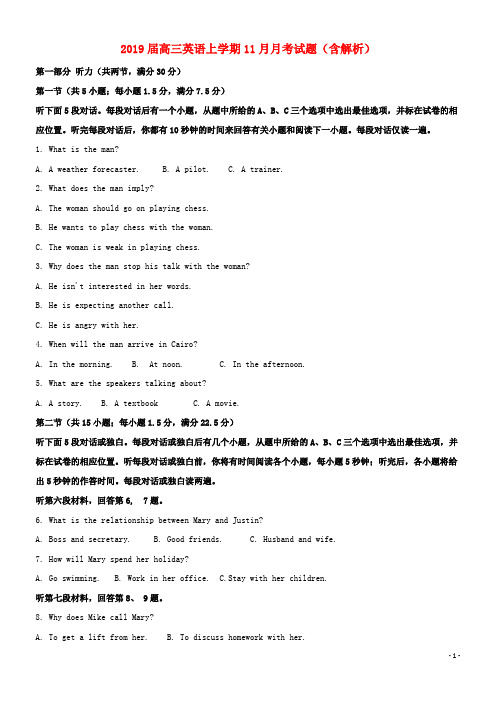
2019届高三英语上学期11月月考试题(含解析)第一部分听力(共两节,满分30分)第一节(共5小题;每小题1.5分,满分7.5分)听下面5段对话。
每段对话后有一个小题,从题中所给的A、B、C三个选项中选出最佳选项,并标在试卷的相应位置。
听完每段对话后,你都有10秒钟的时间来回答有关小题和阅读下一小题。
每段对话仅读一遍。
1. What is the man?A. A weather forecaster.B. A pilot.C. A trainer.2. What does the man imply?A. The woman should go on playing chess.B. He wants to play chess with the woman.C. The woman is weak in playing chess.3. Why does the man stop his talk with the woman?A. He isn't interested in her words.B. He is expecting another call.C. He is angry with her.4. When will the man arrive in Cairo?A. In the morning.B. At noon.C. In the afternoon.5. What are the speakers talking about?A. A story.B. A textbookC. A movie.第二节(共15小题;每小题1.5分,满分22.5分)听下面5段对话或独白。
每段对话或独白后有几个小题,从题中所给的A、B、C三个选项中选出最佳选项,并标在试卷的相应位置。
听每段对话或独白前,你将有时间阅读各个小题,每小题5秒钟;听完后,各小题将给出5秒钟的作答时间。
- 1、下载文档前请自行甄别文档内容的完整性,平台不提供额外的编辑、内容补充、找答案等附加服务。
- 2、"仅部分预览"的文档,不可在线预览部分如存在完整性等问题,可反馈申请退款(可完整预览的文档不适用该条件!)。
- 3、如文档侵犯您的权益,请联系客服反馈,我们会尽快为您处理(人工客服工作时间:9:00-18:30)。
B. She has made an appointment with the man. C. She can ’t have lunch with the man tomorrow.
2. What is the weather like now?
A. Cloudy.
B.Sunny.
C. Ramy.
48 in her eyes. I 49 my fear from her, so she might think I knew what I was doing. But only my Guide
knew.
I just pushed and she steered. Once again the sea of rushing cars 50 and her car finally was stopped at a
D. target
52. A broke
B. blocked
C. grew
D. pulled
53. A embarrassed
B. amazed
C. disappointed
D. excited
(旁观者).
41. A lost
B. settled
C. caught
D. absorbed
42. A noisy
B. dead
C. loose
D. slow
43. A fewer
B. clearer
C. busier
D. worse
44. A deal with
B.touch on
C.look into
A. Fellow travelers.
B. Husband and wife.
C. Passenger and bus dnver.
5. What does the man suggest the woman do?
A. Go on a journey.
B.Set up a company.
C. Apply for a position.
A. Unconcerned.
B. Favorable.
16.When will the woman set off from her apartment?
A.In June.
B. In July.
17.What will the man do for the woman?
A. Inform Jim of her recent research.
Suddenly, the officer began to 56 thinking my car was 57 parked in the ocean of traffic. I explained I
parked my car across the highway. I then drove away after helping out for only a few 58 My Guide sought the“kind act” 一豆豆_ and cleared the way. All I had to do was一旦旦_ being a bystander
B.Ask Jim to clean her apartment.
C. Recommend her apartment to Jim.
昕第10段材料,回答第18 至 20题。
18.What are the listeners expected to do in London?
A. Tour shoe stores.
3. Where does the conversation probably take place?
A. In a classroom.
B. In a library.
C. In a hospital.
4. What is the probable relationship between the speakers?
C. He is fortunate. C. In Kansas.
C. Disappointed. C. In August.
C. Hand in money. C. A tourist guide.
【高三11月质量检测·英语 第2页(共8页)】
huge traffic jam at a stoplight.“Rush hour. ” I thought. But it was an overheated car, 42 in the mjddle lane (车道). With cars driving all around it, I couldn’t stop anywhere without making things 43 . I ha/d to turn left in the thick traffic and couldn’t pull over for a couple of blocks. I thought , “ Maybe this is one I
48. A dishonesty
B. regret
C. hate
D. disbelief
49. A saved
B. hid
C. borrowed
D. protected
50. A froze
B. exploded
C. parted
D. crowded
51. A spot
B. height
C. destination
你都10秒钟的时间来回答有关小题和阅读下一小题。 每段对话仅读一遍。
例: How much is the shirt?
A. £19.15.
B. £9.18.
C. £9.15.
答案是C 。
1. What does the woman mean?
A. She refuses to go to see her dentist at 11:30.
broken car. Letting her car off the highway seemed 45 , but luckily, cars in multiple lanes, going b th ways,
46 opened wide for me to approach her car. So I asked her to release(松开) her brake and steer(掌控方向盘〉 across two more lanes of rushing cars while I 47 her car to the highway’s right side. I saw the fear and
昕第8段材料,回答第11至13题。 11. What does the woman say about the man?
A. He 1s generous.
B. He is famous.
12. Where did the man grow up?
A. In Philadelphia.
B. In Missouri.
C. A list of tips on how to avoid unpleasant accidents.
20.What is most probably the speaker?
A. A hotel manager.
B. A police officer.
C.The man. C. For three years.
A. For a week.
B. For three months.
10. What will the man do tomorrow?
A. Move into a new house.
B. Do shopping at the market.
C. Have a barbecue in the garden.
各题的答题区域内作答,超出答题区域书写的答案无效,在试题卷、草稿纸上作 答无效。
4.本 卷命题范围:高考范围。
第一部分 昕力(共两节,满分30分)
第一节 (共5小题;每小题1. 5分,满分7. 5分)
昕下面5段对话。 每段对话后有一个小题,从题中所给的A、B、C三个选项中选出最佳选项。 昕完每段对话后,
safe 51 just before a police car 52 up behind us. The policeman was一豆豆_ at what he had "'17itnessed. The girl thanked me with a 54 and said her friend was on the 55 and didn’t need my help anymore.
6. What time is it now?
A.1:45.
B.2:10.
C.2:15.
【高三11月质量检测·英语 第1页(共8页〉】
7. What may the woman continue doing?
A. Accompanying Linda in the library.
B. Discussing a project with Michael.
someone else 44 .” But I blamed myself for that.
I turned around and parked my car on a far entrance road. Then I thought about how to help the girl in the
第二节 (共15小题;每小题1. 5分,满分22.5分)
昕下面5段对话或独臼。 每段对话或独自后 有几个小题,从题中所给的A、B、C三个选项 中选出最佳选项。
